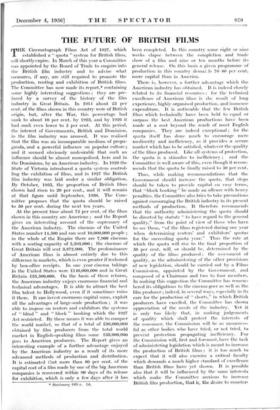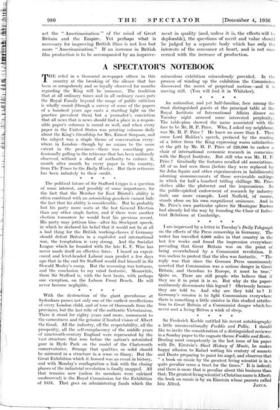THE FUTURE OF BRITISH FILMS
THE Cinematograph Films Act of 1927, which established a " quota " system for British films, will shortly expire. In March of this year a Committee was appointed by the Board of Trade to enquire into the British Olm industry and to advise what measures, if any, are still required to promote the production, renting and exhibition of British films. The Committee has now made its report,* containing some highly interesting suggestions ; they are pre- faced , by a survey of the history of the film industry in Great Britain. In 1914 about 25 per cent. of the films shown in this country were of British origin, but, after the War, this percentage had sunk to about 10 per cent. by 1923, and by 1926 it had sunk even lower to 5 per cent. At this period, the interest of Governments, British and Dominion, in the film industry was aroused. It was realised that the film was an incomparable medium of propa- ganda, and a powerful influence on popular culture; and it seemed obviously undesirable that such an influence should be almost monopolised, here and in the Dominions, by an American industry. In 1926 the State of Victoria introduced a quota system control- ling the exhibition of films, and in 1927 the British film industry was laid under a similar obligation. By October, 1935, the proportion of British films shown had risen to 20 per cent., and it will remain at that figure until September, 1938. The Com- mittee proposes that the quota should be raised to 50 per cent. during the next ten years.
At the present time about 75 per cent. of the films shown in this country are American ; and the Report gives an interesting account of the supremacy of the American industry. The cinemas of the United States number 14,500 and can seat 10,000,000 people ; in the whole of the Empire there are 7,900 cinemas with a seating capacity of 5,593,000 ; the cinemas of Great Britain will seat 8,872,000. The predominance of American films is almost entirely due to this difference in markets, which is even greater if reckoned by box-office receipts. In one year cinema takings in the United States were £140,000,000 and in Great Britain £35,500,000. On the basis of these returns, the American industry enjoys enormous financial and technical advantages. It is able to attract the best film talent to Hollywood, even if it sometimes ruins it there. It can invest enormous capital sums, exploit all the advantages of large-scale production ; it was able to impose on renters and exhibitors the systems of " blind " and " block " booking which the 1927 Act restricted. By these means it was able to conquer the world market, so that of a total of £36,000,000 obtained by film producers from the total world market in English-speaking films some £33,000,000 goes to American producers. The Report gives an interesting example of a further advantage enjoyed by 'the. American industry as a result of its more advanced methods of production and distribution. It is estimated that more than 80 per cent. of the capital cost of a film made by one of the big American companies is recovered within' 90 days of its release for exhibition, which is only a few days after it has
* Stationery Office. ed.
been completed. In this country some eight or nine weeks elapse between the completion and trade show of a film and nine or ten months before its general release. On this basis a given programme of production in this country denial_ is 70-80 per cent. more capital than in America.
There is, however, a further advantage which the American industry has obtained. It is indeed closely related to its financial resources ; for the technical excellence of American films is to result of long experience, highly organised production, and immense expenditure. It is noticeable that the few British films which technically have been held to equal or surpass the best American productions have been made at a cost beyond the reach of most English companies. They are indeed exceptional ; for the quota itself has done much to encourage mere mediocrity and inefficiency, as it provides a secure market which has to be satisfied, whatever the quality of the films produced. Like all systems of protection, the quota is a stimulus to inefficiency ; and the Committee is well aware of this, even though it recom- mends that the quota be finally- raised to 50 per cent. Thus, while making recommendations that the Government should increase the quota, that steps should, be taken to provide capital on easy terms, that "block booking" be made an offence with heavy penalties, the Committee also tries to take precautions against encouraging the British industry in its present methods of production. It therefore recommends that the authority administering the quota should be directed by statute " to have regard to the general quality," from the point of view of those who have to see them, "of the films registered during one year when determining renters' and exhibitors' quotas for the succeeding quota year." Thus the rate at which the quota will rise to the final proportion of 50 per cent. will, or should he, determined by the quality of the films produced -; the assessment of quality, as the administering of the other provisions of new legislation, should be carried out by a Films Commission, appointed by the Government, and composed of a Chairman and two to four members.
In making this suggestion the Committee has remem- bered its obligations to the cinema-goer as well as the film producer ; indeed, in several ways, especially in its care for the pioductioh of " shorts," in which British producers. have excelled, the Committee has shoWn appreciation of the needs of the industry. Yet it is only too likely that, in making judgements of quality which shall protect the interests of the consumer, the Commission will be as unsuccess- ful as other bodies who have tried, or not tried, to prevent protection propagating inefficiency. For the Commission will, first and foremost, have the task of administering legislation which is meant to increase the production of British films ; it is too much to expect that it will also exercise a critical faculty which demands a much higher standard of excellence than British films have yet shown. It is possible also that it will be influenced by the same interests which make the Committee anxious to increase British film production, that is the desire to counter- act the " Americanisation " of the mind of Great Britain and the Empire. Yet perhaps what is necessary for improving British films is not less but more " Americanisation." If an increase in British film production is to be accompanied by an improve- ment in quality (and, unless it is,,the effects will be deplorable), the questions of merit and value should be judged by a separate body which has only the interests of the consumer at heart, and is not con- cerned with the increase of production.





















































 Previous page
Previous page